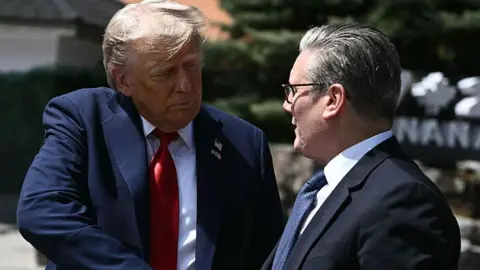President Donald Trump signed an Executive Order implementing key elements of the recently finalized UK–US tariff agreement, officially reducing tariffs on several British exports to the United States. The move follows months of bilateral negotiations aimed at strengthening economic ties while addressing trade imbalances.
Highlights of the Agreement
-
Automobiles and Aerospace
The order cuts U.S. tariffs on British-made cars from 27.5% to 10%, capped at 100,000 vehicles per year. Aerospace exports from the U.K., including aircraft parts and engines, are also exempt from national security tariffs. -
Steel and Aluminum Quotas
Instead of eliminating tariffs outright, the U.S. has agreed to introduce import quotas on British steel and aluminum. Full exemptions will depend on the U.K. meeting certain supply chain transparency and security benchmarks. -
Agriculture and Ethanol Trade
In return, the U.K. has committed to allow 13,000 metric tons of U.S. beef and ethanol imports under relaxed terms. However, contentious issues like hormone-treated beef and food labeling regulations remain unresolved and are likely to be addressed in future talks.
A Strategic Milestone
This agreement marks the first major tariff reduction under the Trump administration’s “reciprocal tariff” strategy, making the United Kingdom the only nation outside of North America to secure such broad tariff relief. It reflects a broader geopolitical strategy to shift trade closer to trusted allies and reduce dependence on unfriendly or non-compliant partners.
What’s Next
-
Implementation Timeline
The Executive Order is expected to take effect by the end of June 2025, following its publication in the Federal Register. Customs and regulatory authorities in both countries are preparing for the rollout. -
Pending Issues
Steel and aluminum quotas are subject to final negotiations. The U.S. is requesting assurances that Chinese-origin metals are not routed through the U.K., prompting reviews of British supply chains. Issues related to pharmaceutical trade, regulatory equivalence, and digital services remain on the table.
Sector-by-Sector Impact
| Sector | Key Impact |
|---|---|
| Automotive | Major benefit for British manufacturers with reduced car export tariffs. |
| Aerospace | Full exemption from national security duties enhances competitiveness. |
| Metals | Conditional access pending quota and compliance; uncertainty remains. |
| Agriculture | Gains for U.S. beef and ethanol exporters; cautious acceptance in the U.K. |
| Trade Policy | Advances the “friend-shoring” approach and bilateral trade alignment. |
President Trump’s Executive Order activating key parts of the UK–US tariff deal is a significant development in post-Brexit trade relations. While it delivers immediate gains to strategic sectors like automotive and aerospace, the deal also sets the stage for broader negotiations on metals, agriculture, and high-tech trade. With some elements still under negotiation, this move reflects a step toward closer economic alignment between the two allies—anchored in security, mutual benefit, and strategic trust.



